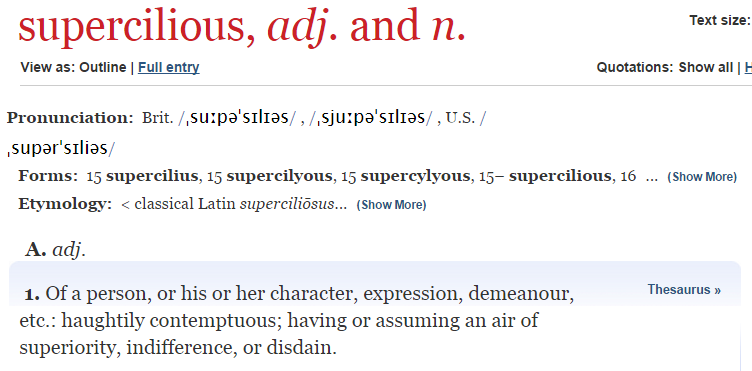I was thinking about the word, supercilious, this morning and looked it up in the OED.
I think I saw this attitude on the faces of some of the players (mostly profs) at the concert on Friday evening (I do not mean you, Rhonda!). I won’t go into detail because it’s probably not that appropriate. But I was reminded of it when I read the word in this sentence this morning:
“[M]y pleasure at the piano is matched by frustration at many of the fusty rituals of modern concert-giving, in which the music is served up with the superciliousness of a sneering sommelier offering overpriced wine at a too-long-established restaurant.”
Kenneth Hamilton, After the Golden Age:Romantic Pianism and Modern Performance p. viii
So I was looking up the word, “sommelier,” to make sure I understood it (it means wine waiter, sooprise) and I started thinking about the word, supercilious. Even though I was pretty sure I understood it, I have found it helpful to read definitions of words I know, plus check the quotes.
Checking the quotes in the OED paid off.
2004 Believer July 20/3 If Miyoshi nailed the English-prof..caricature, the next speaker..comes across as the stuffy,supercilious poseur.
It’s sometimes interesting to start with the most recent quotes since they have been added often from quotes from this century. I especially liked the next one:
1990 E. Kraft Reservations Recommended i. 10 The kind of supercilious shithead who wouldn’t deign to talk to a cabdriver.
I found myself drawn more deeply into some music yesterday. First in the morning I played slowly through Beethoven’s last piano sonata. Someone said recently in my presence that Beethoven had “invented boogie woogie” in this movement.
When I heard that I remembered what a music prof I know had said about this movement, that it was a “Jazzy” movement.
Both comments confused me so I thought I would investigate. After going through the movement slowly, the “jazz”comment made more sense to me than the “boogie woogie” one. But neither are that helpful or even accurate from my understanding as a person who likes and performs Beethoven, jazz and boogie woogie.
The “Jazz comment” must reflect Beethoven’s use of accents on the last third of beats which might create a jazzy feel especially to a classically trained musician. But Beethoven does this sort of thing a lot. I think it could almost be understood as a signature trait of his composing.
The “boogie woogie” comment is harder to understand. I understand boogie woogie as a driving tempo with a certain bass figure that uses alternate octaves. I guess this is present in this sonata, but I have noticed Beethoven (and other classical composers of the 19th century) occasionally slipping into the alternating octaves of boogie without actually writing boogie.
Later in the afternoon at the organ console, I found myself caught up in reading a bunch of Mendelssohn and several Bach trio sonata movements. Excellent music.
